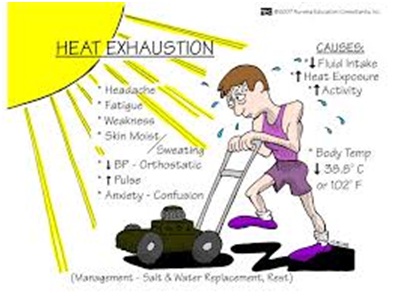Heat Exhaustion Causes, Symptoms, Diagnosis and Treatment

What Is Heat Exhaustion?
Heat Exhaustion is a severe form of heat illness which can occur after one has been exposed to high temperatures, and it often is accompanied by dehydration.
There are two types of heat exhaustion:
- Water depletion
- Salt depletion
Causes Of Heat Exhaustion:
Heat exhaustion occurs when the body is unable to cool itself.
Causes of heat exhaustion include:
- Hot weather
- Strenuous exercising
- Dehydration,which reduces the body’s ability to sweat and maintain a normal temperature
- Alcohol use,which can affect the body’s ability to regulate the temperature
- Overdressing,particularly in clothes that don’t allow sweat to evaporate easily
These factors increase the likelihood of heat exhaustion:
- Young age or old age.
Infants and children who are younger than 4 years and adults who are older than 65 years are at a higher risk of heat exhaustion.
- Certain drugs.
Medications that affect the body’s ability to stay hydrated and respond appropriately to heat can increase the chances of heat exhaustion.
Carrying excess weight can affect the body’s ability to regulate its temperature and cause your body to retain more heat.
- Sudden temperature changes.
- A high heat index.
Symptoms Of Heat Exhaustion:
The following symptoms may be exhibited:
- Cool, moist skin with goose bumps when in the heat
- Heavy sweating
- Faintness
- Dizziness
- Fatigue
- Weak, rapid pulse
- Low blood pressure upon standing
- Muscle cramps
- Nausea
- Headache
- Rapid heart beat
- Pale skin
- Abdominal cramps
- Dark colored urine
Diagnosis Of Heat Exhaustion:
Heat exhaustion is generally diagnosed via the apparent look and by taking the body temperature of the patient.
However, the following tests may be conducted:
- A blood test
- A urine test
- Muscle function tests
- Imaging tests
Treatment Of Heat Exhaustion:
Heat exhaustion can be treated at home by doing the following:
- Rest in a cool place.
- Drink cool fluids.
- Try cooling measures.
- taking a cool shower
- soaking in a cool bath or
- Putting towels soaked in cool water on the skin.
- Loosen clothing.
If home remedies do not work, IV fluids can be used in order to rehydrate the body.
By : Natural Health News




